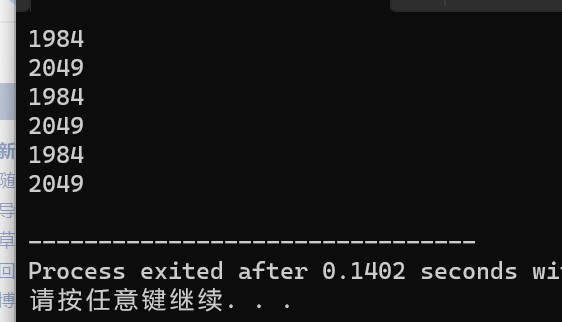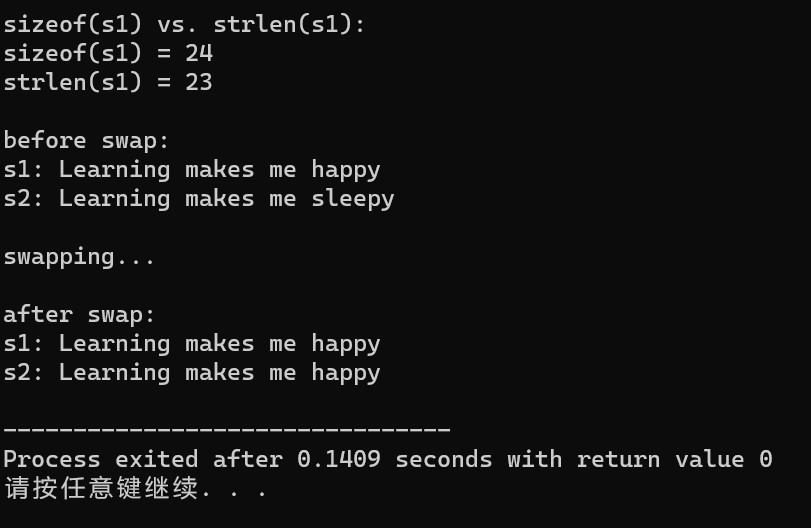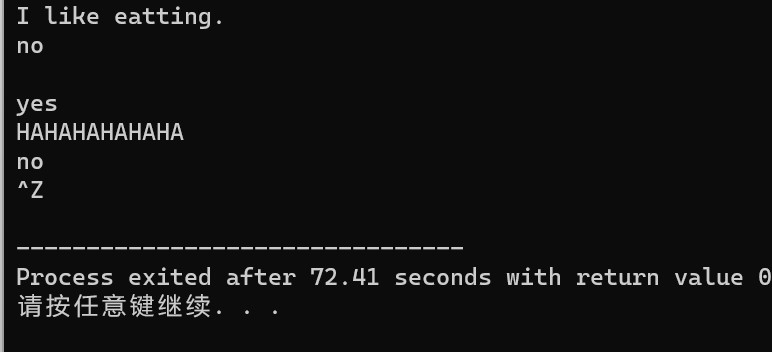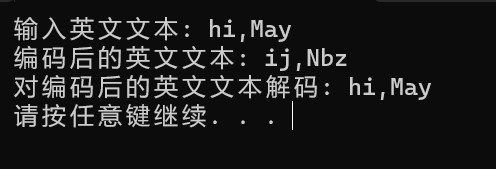实验5
实验任务1:
1.1
#include <stdio.h> #define N 4 int main() { int x[N] = {1,9,8,4}; int i; int *p; for(i = 0;i<N;i++) printf("%d",x[i]); printf("\n"); for(p=x;p<x+N;++p) printf("%d",*p); printf("\n"); p = x; for(i = 0;i<N;++i) printf("%d",p[i]); printf("\n"); p = x; for(i = 0;i<N;++i) printf("%d",*(p+i)); printf("\n"); return 0; }

1.2
#include <stdio.h> int main() { int x[2][4] = {{1,9,8,4},{2,0,4,9}}; int i,j; int *p;//指针变量,存放int型元素的一维数组 int(*q)[4];//指针变量,指向包含4个int型元素的一维数组 //使用数组名,下标访问二维数组元素 for(i=0;i<2;++i) { for(j = 0;j<4;++j) printf("%d",x[i][j]); printf("\n"); } //使用指针变量p间接访问二维数组元素 for(p = &x[0][0],i = 0;p<&x[0][0]+8;++p,++i) { printf("%d",*p); if((i+1)%4 == 0) printf("\n"); } //使用指针变量q间接访问二维数组元素 for(q = x;q<x+2;++q) { for(j = 0;j<4;++j) printf("%d",*(*q+j)); printf("\n"); } return 0; }

实验任务2:
2.1
#include <stdio.h> #include <string.h> #define N 80 int main() { char s1[] = "Learning makes me happy"; char s2[] = "Learning makes me sleepy"; char tmp[N]; printf("sizeof(s1) vs. strlen(s1): \n"); printf("sizeof(s1) = %d\n",sizeof(s1)); printf("strlen(s1) = %d\n",strlen(s1)); printf("\nbefore swap: \n"); printf("s1: %s\n",s1); printf("s2: %s\n",s2); printf("\nswapping...\n"); strcpy(tmp,s1); strcpy(s2,s1); strcpy(s2,tmp); printf("\nafter swap: \n"); printf("s1: %s\n",s1); printf("s2: %s\n",s2); return 0; }

1.数组s1大小是24,size(s1)计算地是s1在储存空间中占用的字节数,strlen统计的是s1中除空字符以外的字符个数。
2.不能,s1为字符数组名,用赋值号不能直接给字符串赋值,需要应用strcpy函数。
3.没有发生互换,只是让s2变成了s1。
2.2
#include <stdio.h> #include <string.h> #define N 80 int main() { char *s1="Learning makes me happy"; char *s2="Learning makes me sleepy"; char *tmp; printf("sizeof(s1) vs. strlen(s1): \n"); printf("sizeof(s1) = %d\n",sizeof(s1)); printf("strlen(s1) = %d\n",strlen(s1)); printf("\nbefore swap: \n"); printf("s1: %s\n",s1); printf("s2: %s\n",s2); printf("\swapping...\n"); tmp = s1; s1 = s2; s2 = tmp; printf("\after swap: \n"); printf("s1: %s\n",s1); printf("s2: %s\n",s2); return 0; }
1.s1中存放的是字符串第一个元素的地址 sizeof(s1)计算的是Learning所占的字节数,strlen(s1)统计的数字符串中非空字符的个数。
2.可以,因为s1为指针变量,可以使用赋值号,将字符串第一个元素的地址赋给指针变量。2.1中的s1为字符数组名,不能用赋值号。
3.交换了指针所指字符串,储存单元并没有变。
实验任务3:
#include <stdio.h> void str_cpy(char *target, const char *source); void str_cat(char *str1, char *str2); int main() { char s1[80], s2[20] = "1984"; str_cpy(s1,s2); puts(s1); str_cat(s1,"Animal Farm"); puts(s1); return 0; } void str_cpy(char *target, const char *source) { while (*target++ = *source++) ; } void str_cat(char *str1,char *str2) { while (*str1) str1++; while (*str1++ = *str2++) ; }

实验任务4:
#include <stdio.h> #define N 80 int func(char *); int main() { char str[80]; while (gets(str) != NULL) { if(func(str)) printf("yes\n"); else printf("no\n"); } return 0; } int func(char *str) { char *begin, *end; begin = end = str; while(*end) end++; end--; while(begin<end) { if(*begin != *end) return 0; else { begin++; end--; } } return 1; }

实验任务5:
#include <stdio.h> #define N 80 void func(char *) ; int main() { char s[N]; while(scanf("%s",s) != EOF) { func(s); puts(s); } return 0; } void func(char *str) { int i; char *p1, *p2,*p; p1 = str; while(*p1 == '*') p1++; p2 = str; while(*p2) p2++; p2--; while(*p2 == '*') p2--; p = str; i = 0; while(p<p1) { str[i] = *p; p++; i++; } while(p<=p2) { if(*p != '*') { str[i] = *p; i++; } p++; } while(*p != '\0') { str[i] = *p; p++; i++; } str[i] = '\0'; }

实验任务6:
#include <stdio.h> #include <string.h> void sort(char *name[],int n); int main() { char *course[4] = {"C Program", "C++ Object Oriented Program", "Operating System", "Data Structure and Algorothms"}; int i; sort(course,4); for(i = 0;i<4;i++) printf("%s\n",course[i]); return 0; } void sort(char *name[],int n) { int i,j; char *tmp; for(i = 0;i<n-1;++i) for(j=0;j<n-1-i;++j) if(strcmp(name[j],name[j+1])>0) { tmp = name[j]; name[j] = name[j+1]; name[j+1] = tmp; } }

6.2:
#include <stdio.h> #include <string.h> void sort(char *name[], int n); int main() { char *course[4] = {"C Program", "C++ Object Oriented Program", "Operating System", "Data Structure and Algorithms"}; int i; sort(course,4); for(i = 0;i<4;i++) printf("%s\n",course[i]); return 0; } void sort(char *name[],int n) { int i,j,k; char *tmp; for(i = 0;i<n-1;i++) { k = i; for(j = i+1;j<n;j++) if(strcmp(name[j],name[k])<0) k = j; if(k != i) { tmp = name[i]; name[i] = name[k]; name[k] = tmp; } } }

交换的是指针变量的值。
实验任务7:
#include <stdio.h> #include <string.h> #define N 5 int check_id(char *str); // 函数声明 int main() { char *pid[N] = {"31010120000721656X", "330106199609203301", "53010220051126571", "510104199211197977", "53010220051126133Y"}; int i; for (i = 0; i < N; ++i) if (check_id(pid[i])) // 函数调用 printf("%s\tTrue\n", pid[i]); else printf("%s\tFalse\n", pid[i]); return 0; } // 函数定义 // 功能: 检查指针str指向的身份证号码串形式上是否合法。 // 形式合法,返回1,否则,返回0 int check_id(char *str) { if(strlen(str)!=18) return 0; else { char *p; p=str; while(*p>='0'&&*p<='9'||*p=='X') p++; if(*p=='\0') return 1; else return 0; } }

实验任务8:
#include <stdio.h> #include<stdlib.h> #define N 80 void encoder(char *s); void decoder(char *s); int main() { char words[N]; printf("输入英文文本: "); gets(words); printf("编码后的英文文本: "); encoder(words); printf("%s\n", words); printf("对编码后的英文文本解码: "); decoder(words); printf("%s\n", words); system("pause"); return 0; } void encoder(char *s) { while(*s){ if((*s>='a'&&*s<'z')||(*s>='A'&&*s<'Z')) *s=*s+1; else if(*s=='z'||*s=='Z') *s=*s-25; s++; } } void decoder(char *s) { while(*s){ if((*s>'a'&&*s<='z')||(*s>'A'&&*s<='Z')) *s=*s-1; else if(*s=='a'||*s=='A') *s=*s+25; s++; } }




 浙公网安备 33010602011771号
浙公网安备 33010602011771号